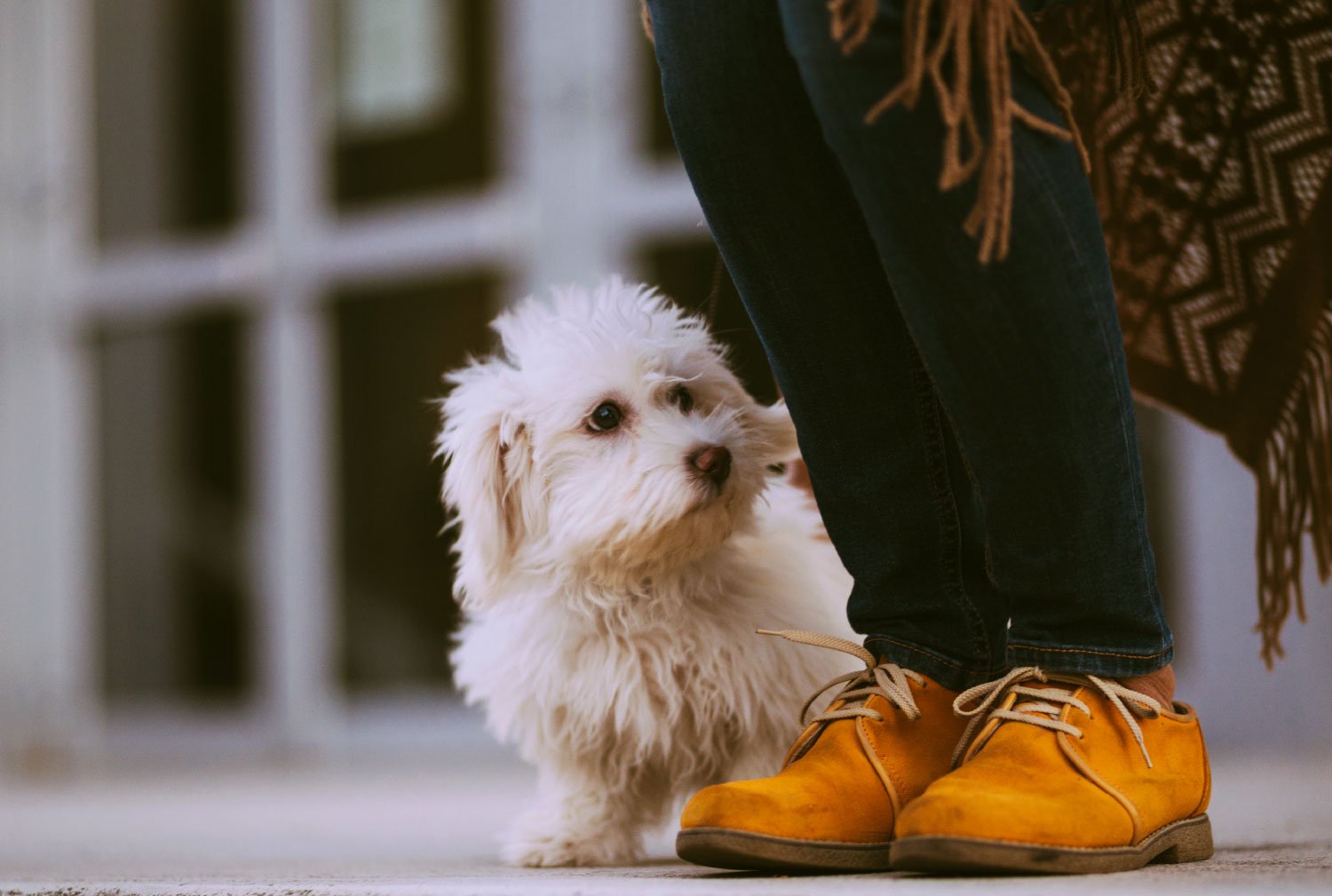THINGS WE DO

PET DENTAL CARE AT HOME
Dental disease and tartar accumulation are very common in pets and can lead to serious mouth problems ranging from simple gum infections and gingivitis to serious diseases with tooth, bone and gum loss.
Dental disease and tartar accumulation are very common in pets and can lead to serious mouth problems ranging from simple gum infections and gingivitis to serious diseases with tooth, bone and gum loss. Plaque refers to the soft, easily removable build-up that can form on teeth. Tartar refers to when this plaque build-up calcifies and becomes hard. To remove tartar, a scale and polish under general anaesthetic is advised, as it cannot be removed with dental care at home.
Here are some simple steps for you to follow at home to care for your pet's teeth and prevent irreversible dental disease with dog dental care and cat dental care.

Food To Keep Your Pet’s Teeth Clean
There are a variety of dental diets on the market. They all work in a similar way, by making your pet crunch on kibble specifically designed to clean away plaque as they chew, and by having ingredients that reduce how much plaque can stick to their teeth.
Our Recommendations
Hill's t/d for cats and dogs is a balanced diet that has been designed to ensure the teeth and gums are cleaned every time the dog or cat crunches into the kibble pieces. It also has an enzyme that can help to break down plaque on the teeth.
This food is very tasty so be careful not to overfeed as this could lead to weight gain.
Royal Canin Dental for cats and dogs is also a balanced diet that can help remove plaque on the teeth as your pet chews through the kibble. It also has added ingredients to help reduce plaque formation.
Delicate Care Dental for dogs and cats is another balanced diet and a good option for those pets with sensitive stomachs. This diet works by including an ingredient that can help reduce the plaque build-up on the teeth. It also works by physically reducing the plaque build-up as your pet chews through the kibble pieces. This diet is hypoallergenic and fish-based - great for if your pet has a chicken or beef allergy.
Caution for Feeding Raw Bones
There are very polarised views on feeding bones to pets. Dental specialists end up treating a lot of teeth that are fractured due to bone chewing.
There are safer options available, such as specially formulated dental chews fed once a day, eg. Greenies, Oravet chews or Dentastix. Remember that treats are a source of calories and may lead to weight problems if too many are given.
We do not recommend feeding deer antlers or goat horns. Both of these are very hard and can fracture teeth quite easily.

Clean Your Pet's Teeth Regularly
Brushing your pets’ teeth daily is the most effective way of fighting dental plaque and tartar. It is best to start brushing your pets’ teeth at an early age to get them accustomed to the routine of dog dental care or cat dental care.
Tips For Brushing Your Pets’ Teeth
It is easier to stand beside or behind your pet rather than in front when brushing.
Ensure your pet is relaxed before you start; give them lots of pats!
Choose a soft toothbrush and ensure it isn’t too big for your pet's mouth. There is a range of “animal” toothbrushes available, including “finger toothbrushes”, which are ideal for cats and small dogs.
Use toothpaste that is specially formulated for animals - DO NOT use human toothpaste.
Make sure you squeeze the toothpaste in between the hairs of the brush. This stops your pet from licking it off.
When you first start brushing, only clean a few teeth. It is often easiest to start with the molars at the side of the mouth. Each time you brush, you can add a few more teeth until, eventually, you can clean the whole mouth.
Initially, concentrate on brushing the outside of the mouth, especially along the gum line. As you and your pet get used to brushing, you can start reaching inside the mouth to clean the inside of the teeth.
Don’t forget to reward your pet at the end with lots of pats, a walk or a toy.
Note: if you become threatened by your pet’s behaviour while brushing or if your pet becomes aggressive, do not persist.
How often should you brush your pets’ teeth? Ideally, it would be best if you did it every day. However, brushing every second day or even once a week is better than nothing!

Dental Product Recommendations
ORAL WASHES
Oral washes/gels can help reduce plaque and tartar formation, help clean mouths, and freshen breath with or without brushing. Most pets seem to accept them readily. Those containing chlorhexidine are an excellent choice and can be applied directly to the teeth or wiped on with gauze or stocking/pantyhose-covered fingers.
Our Recommendation
Maxi/Guard Oral Cleansing Gel: This gel can be applied to the teeth with your finger, gauze, or toothbrush. It works by reducing plaque build-up, gum inflammation, and mouth odours.
DRINKING WATER ADDITIVES
These help reduce plaque adhesion on the teeth and keep bacterial populations to a minimum.
Our Recommendation
Oxyfresh: This is a product that is added to your pet’s regular drinking water. It has ingredients that reduce the amount of plaque that sticks to your pet’s teeth. It can reduce bad breath, and it promotes good gum health.
This product is suitable for multi-animal households as all animals can safely drink the same water.
DENTAL CHEWS
Chews can help reduce tartar formation by physically removing plaque. To be of any benefit, these chews need to be given at least every second day, but daily dental chews are of the most benefit.
Our Recommendation
Oravet chews: These work by making your pet chew to physically remove plaque build-up. Oravet also works by having a plaque-fighting ingredient within the chew to reduce the amount of plaque sticking to your pet's teeth.
Greenies: These work by making your pet chew to help physically remove plaque build-up.
Dental Examinations
Even with the best pet dental care at home, some pets still require professional examination and cleaning frequently. Just like humans, some pets have better general dental health than others. Untreated dental disease results in infection and discomfort in the mouth. This can lead to serious problems, such as bacteria entering the bloodstream and damaging the heart valves or other organs.
It is amazing what our pets will put up with when it comes to pain, so even though they are still crunching through their kibble or playing with their toys; they could still be living with a painful mouth.
While all pet dental care products can be helpful, nothing is better than daily (or even twice daily) tooth brushing. Unfortunately, there is no set-and-forget option, but luckily there are a number of different options to suit every pet and their families.
FAQ’s
HOW CAN MY PET HAVE BAD BREATH IF THEIR TEETH LOOK CLEAN?
Bad breath is caused by bacteria in the mouth. Calculus forms a layer that the bacteria like to stick in, but we can have pockets under the gum that we cant see, where the bacteria like to live. A full dental examination will help us form a plan to treat the bad breath.
WHAT IF MY PET WON’T TOLERATE TOOTH BRUSHING?
That’s okay! Some pets just don’t like people being around their faces. If this is the case, we can consider alternatives such as a dental diet, dental chews or water additives.
WHAT IF I CAN ONLY FIND THE TIME TO BRUSH MY PET’S TEETH ONCE A FORTNIGHT?
While something is better than nothing, studies have shown that for there to be any benefit, teeth need to be brushed every second day at a minimum. If this can’t be managed, we can look at alternatives like a dental diet, dental chews or water additives.
WHAT IF I’M GIVING MY PET A DENTAL CHEW EVERY WEEK?
Again, while something is better than nothing, for us to see the benefit of giving dental chews, they need to be given every second day at a minimum.
WHY DO I HAVE TO DO DENTAL CAR AT HGOME WHEN MY PET JUST HAD A CLEAN UNDER ANAESTHETIC?
Plaque begins to build up within just 1 day after a scale and polish. It is much easier to maintain a clean and healthy mouth after a scale and polish if we continue dental care at home immediately after a routine clean. If we have extracted any teeth while they have been under anaesthetic, we will tailor our advice to suit your pet’s needs.
Health considerations
Regular Health Checks
Prevention is better than a cure! Schedule regular health checks to keep on top of your pet’s dental health.
Dental Disease
Keep an eye out for signs of dental disease, such as bad breath, swollen or bleeding gums, difficulty chewing, drooling, or reluctance to eat. These could indicate dental problems that require attention from a veterinarian.
Start Early
Begin dental care routines early in your pet’s life to establish good habits and prevent dental problems from developing. Start by gently handling your pet’s mouth and gradually introduce teeth brushing and other dental care practices as they become more comfortable.
Dental Chews
Provide regular dental chews for dogs. Ensure that you provide treats in different shapes, textures, and sizes to engage all the teeth in the chewing process.
Tooth Brushing
Brushing your pet’s teeth regularly is one of the most effective ways to prevent plaque and tartar buildup. Use a pet-specific toothpaste and gradually introduce the process to your pet to make it a positive experience.
Professional Dental Care
A professional dental clean may be recommended by our vets if your pet has signs of dental disease. Professional dental cleans are performed under anaesthesia to allow for a thorough examination and cleaning of your pet’s teeth, ensuring optimal dental health.
MORE OF

Be forever













